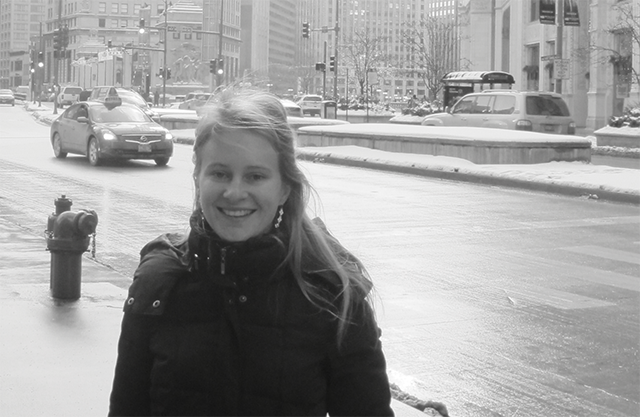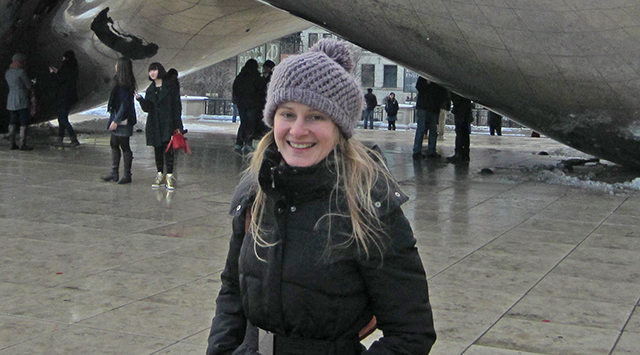From diamonds to data, this multi-faceted researcher is always learning something new
With the U.S. unemployment rate hovering near historic lows, for many, finding a job has never been easier. But landing the right job—one that provides the best fit for a jobseeker’s skills, needs, and personality—is often maddeningly difficult.
Birgit Hausmann, Ph.D. ’13, is using data science and machine learning to make that process simpler and more effective. Hausmann, an applied physics alumna of the Harvard John A. Paulson School of Engineering and Applied Sciences and Graduate School of Arts and Sciences, is a senior data scientist at Glassdoor, one of the world’s largest job and recruiting websites.
She develops algorithms designed to return the most relevant job search results for Glassdoor’s 62 million monthly users, while balancing the ranking of sponsored jobs that generate revenue.
“It’s challenging because there are so many factors involved,” she said. “The machine-learning algorithm behind job search results incorporates information related to the employer, while also leveraging more personalized aspects of the user.”

Hausmann and her team are currently focusing on personalization, leveraging information users choose to give Glassdoor, like a resume, to identify more suitable job postings.
“I love that my job still has a research side,” she said. “At its core, there is an exploratory nature to our work and we are constantly imagining what types of novel features one can add, and how best to implement them. And of course, eventually we have to test these additions to ensure that the algorithm improves.”
Hausmann’s passion for research has fueled her career.
After developing an interest in math as a teenager, the Munich, Germany native decided to study physics because she wanted to conduct intricate experiments. She got her chance during a yearlong undergraduate thesis project exploring the quantum optical properties of defects in diamond.
“That project showed me that you can succeed at making something completely new, something no one else has ever done before,” she said. “I was inspired to dig deeper.”
She joined the lab of Marko Loncar, Tiantsai Lin Professor of Electrical Engineering, where she worked on non-linear optics and photonic devices.
Hausmann was fascinated by scientists’ increasing abilities to control individual quantum systems at the nanoscale.
She and her collaborators focused on one such system, the Nitrogen-Vacancy (NV) defect center in diamond. Much like a single atom, the NV center can be prepared, controlled, and interrogated using laser light. However, one of the main challenges was to collect enough laser light to discern the quantum state of the defect.
Hausmann worked to increase this collection efficiency and also developed new microscale diamond structures that can generate light at different wavelengths.
This work has many applications, ranging from quantum information processing to quantum sensing.
“There is a lot of excitement around quantum science right now,” she said. “Actually being able to make quantum devices, test them in experiments, and see them working was tremendously rewarding after all the long hours in the lab.”
Hausmann planned on an industry career so she could have a more immediate impact on the world. But as she finished her thesis, she became enthralled by data science, and how massive datasets could be utilized to improve people’s lives.
Despite being a newcomer to the field, she completed a short data science program called Insight Data Science to build initial skills and then dove into a data scientist position at Glassdoor three years ago.
“It was challenging to switch gears, because I lacked a lot of programming skills,” she said. “But one of the reasons I decided to pursue a Ph.D. is because I love learning new things, so I jumped into cold water and tried my best to gain the knowledge as fast as I could.”

At Glassdoor, she approaches brand new problems with the tenacity of an academic researcher, which helps her drill down on the fundamental issues.
“Being curious and trusting your intuition are the cornerstones for successfully exploring data and are the same skills you need to succeed in Ph.D. research,” she said.
And Hausmann still has one foot planted in quantum research as advisor of a German startup, NVision Imaging Technology. The firm leverages the unique properties of NV centers in diamond to explore applications in nanoscale imaging and sensing that could be utilized in commercial devices.
While the product is still in its early stages, she enjoys staying connected to a different side of industry that keeps her immersed in the constantly evolving world of quantum science.
“For me, it is fun to stay close to my Ph.D. research,” she said. “I can use the skills, techniques, and tools I honed during my Ph.D. to help others progress forward, while still constantly learning new things. That’s the most rewarding.”